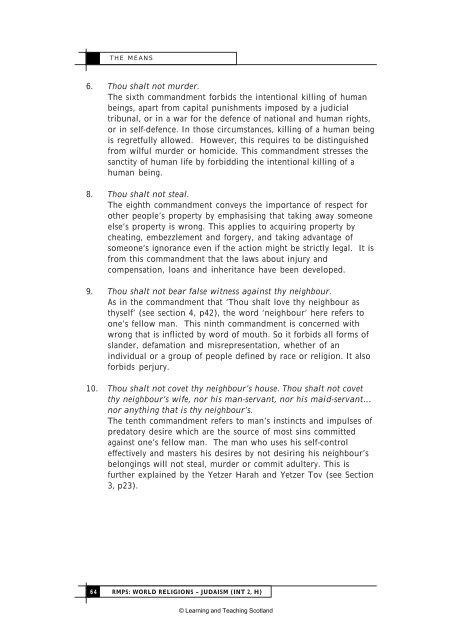RMPS - Int2/Higher - World Religions - Judaism - Education Scotland
RMPS - Int2/Higher - World Religions - Judaism - Education Scotland
RMPS - Int2/Higher - World Religions - Judaism - Education Scotland
Create successful ePaper yourself
Turn your PDF publications into a flip-book with our unique Google optimized e-Paper software.
THE MEANS<br />
6. Thou shalt not murder.<br />
The sixth commandment forbids the intentional killing of human<br />
beings, apart from capital punishments imposed by a judicial<br />
tribunal, or in a war for the defence of national and human rights,<br />
or in self-defence. In those circumstances, killing of a human being<br />
is regretfully allowed. However, this requires to be distinguished<br />
from wilful murder or homicide. This commandment stresses the<br />
sanctity of human life by forbidding the intentional killing of a<br />
human being.<br />
8. Thou shalt not steal.<br />
The eighth commandment conveys the importance of respect for<br />
other people’s property by emphasising that taking away someone<br />
else’s property is wrong. This applies to acquiring property by<br />
cheating, embezzlement and forgery, and taking advantage of<br />
someone’s ignorance even if the action might be strictly legal. It is<br />
from this commandment that the laws about injury and<br />
compensation, loans and inheritance have been developed.<br />
9. Thou shalt not bear false witness against thy neighbour.<br />
As in the commandment that ‘Thou shalt love thy neighbour as<br />
thyself’ (see section 4, p42), the word ‘neighbour’ here refers to<br />
one’s fellow man. This ninth commandment is concerned with<br />
wrong that is inflicted by word of mouth. So it forbids all forms of<br />
slander, defamation and misrepresentation, whether of an<br />
individual or a group of people defined by race or religion. It also<br />
forbids perjury.<br />
10. Thou shalt not covet thy neighbour’s house. Thou shalt not covet<br />
thy neighbour’s wife, nor his man-servant, nor his maid-servant…<br />
nor anything that is thy neighbour’s.<br />
The tenth commandment refers to man’s instincts and impulses of<br />
predatory desire which are the source of most sins committed<br />
against one’s fellow man. The man who uses his self-control<br />
effectively and masters his desires by not desiring his neighbour’s<br />
belongings will not steal, murder or commit adultery. This is<br />
further explained by the Yetzer Harah and Yetzer Tov (see Section<br />
3, p23).<br />
64<br />
<strong>RMPS</strong>: WORLD RELIGIONS – JUDAISM (INT 2, H)<br />
© Learning and Teaching <strong>Scotland</strong>
















